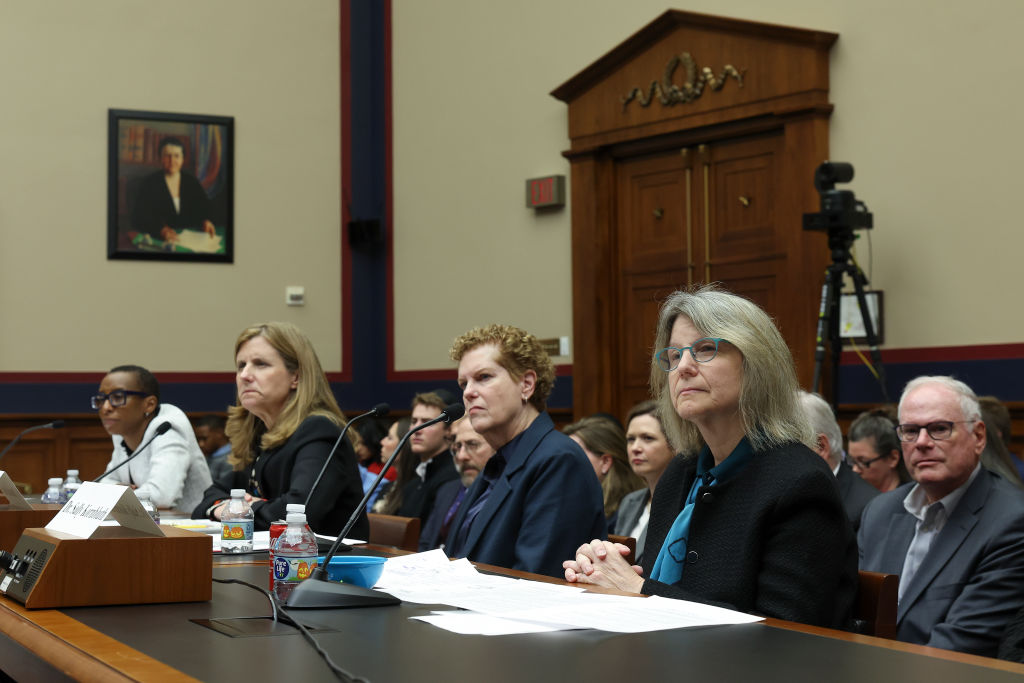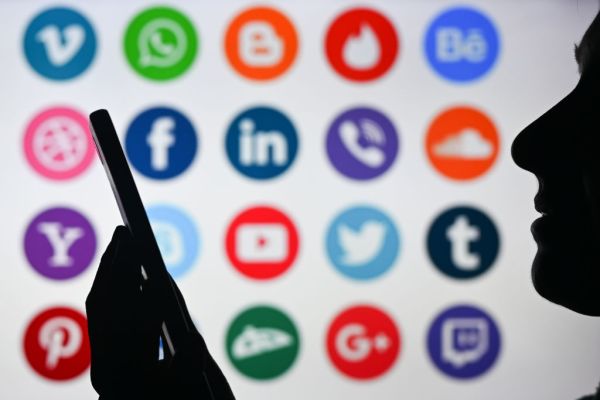Being a university president amid the Israel-Hamas war has not been especially pleasant, and last week things got quite a bit more unpleasant for three in particular. The heads of Harvard, MIT, and Penn who testified before a House committee probably anticipated pushback—a hearing billed as “Holding Campus Leaders Accountable and Confronting Antisemitism” was never going to be a good time. But they could not have foreseen just how bad a time it would be.
The most viral moment of the testimony happened when Republican Rep. Elise Stefanik demanded a “yes or no” answer from each president as to whether “calling for the genocide of Jews” violates their respective university’s code of conduct. When the presidents responded that the answer was complicated and “context-dependent,” Stefanik shot back. “These are unacceptable answers across the board,” she said.
The fallout was swift. Criticism of the university presidents’ testimony quickly mounted, even from the White House. Penn President Liz Magill stepped down from her position on Saturday. Claudine Gay appears to have secured the backing of Harvard’s board but nevertheless faced multiple calls for her resignation. MIT’s Sally Kornbluth has so far dodged the damage, but that might well be temporary. And for her part, Stefanik greeted the news of Magill’s resignation by tweeting, “One down. Two to go.”
Many universities clearly have a serious antisemitism problem. It’s reasonable, albeit difficult, to investigate the sources of the problem or identify ways to address it. But the congressional hearing did not shed much light on those questions. Instead, the hearing itself and questions posed to the witnesses highlight one proposed solution: cracking down on antisemitic speech on campus.
It’s a familiar response. Universities have for several decades responded to offensive, even heinous, speech by adopting speech codes that purport to regulate “hate speech.” Yet there is little evidence that such policies are effective, and courts have ruled they are unconstitutional at public universities. (There is no hate speech exception to the First Amendment.) This has not, however, prevented campuses from virtue signaling by adopting speech codes or looking for creative ways to suppress and punish speech that college administrators do not like.
There is every reason to think that universities will take the same approach here. The Wharton School board of advisers at Penn adopted resolutions calling on the university to punish “hate speech, whether veiled or explicit.” Even a member of Penn’s Open Expression Committee backs “restricting poisonous speech” on campus. This is the political path of least resistance, the easiest and most direct way to respond to pressure from donors and alumni who want universities to “do something” about campus antisemitism. It would bring Jewish students more explicitly under the umbrella of the university administrative apparatus for policing campus speech.
The university presidents at the House hearing were playing with a bad hand, but they did not do themselves any favors in their answers to Stefanik. Each had, at various points in the hearing, emphasized that antisemitic speech and conduct are morally appalling and could, in some contexts, run afoul of existing university policies designed to protect equal student access to educational opportunities on campus. Undoubtedly, they felt that they had already delivered that message when Stefanik pressed them with her “yes or no” on hypothetical calls for genocide.
But they did not appreciate the information environment in which Congress operates. A public congressional hearing now consists of a series of discrete potential soundbites designed to bring attention to individual members of Congress. In that context, a witness seeking to protect his or her own interests must always think like a politician, anticipating how an exchange will play out on social media and cable news shows. Technical legal answers will not get the job done, and Magill et al. did in fact give reasonable legal answers. They were, however, poor political answers.
For universities following the general principles of the First Amendment, even calls for genocide would be protected political speech when delivered on the campus quad as part of general advocacy. Modern constitutional jurisprudence protects violent political rhetoric, so long as it does not meet the strict standards of inciting imminent violence or posing a true threat. At the same time, there are circumstances in which “calls for genocide” on campus might constitute harrasment, or a campus disturbance, or violate guidelines on how to engage with controversial material in the classroom. Even without regulations, at least some instances of “hate speech” violate university policies—not all, though, and for some there’s the rub.
But there are good reasons why constitutional law and university policies have moved toward being more protective of speech. Stefanik’s own question illustrates them.
American universities have not generally faced many explicit examples of “calls for genocide.” They have, however, seen lots of political slogans that some regard as having genocidal implications, especially when paired to the immediate context of October 7. But this means that university officials would much more often face decisions about how to address chants to “Globalize the Intifada” or “From the River to the Sea,” rather than chants to “Gas the Jews.” Palestinian students might in turn insist that the students waving the Israeli flag are engaging in genocidal hate speech.
Even if one could confidently define a rule regarding prohibited hate speech, one would likewise need a great deal of confidence in those put in charge of administering it. But history teaches us that we should have little faith in those would-be censors: One man’s hate speech often turns out to be another man’s passionate political rhetoric. Speech codes would put more speakers at the mercy of campus administrators who will often find that political speech they disfavor is happily a policy violation and can be aggressively suppressed. The protection of one’s political speech would depend on how much political power one wields on the university campus.
The presidents’ bad hand in the hearings did not stem from a lack of hate speech regulations. Rather, it was due to the terrible track record that American universities have regarding principled free speech positions on campus. Harvard ranked dead last in the Foundation for Individual Rights and Expression’s (FIRE) annual campus free speech rankings, and Penn was just one slot above them. Universities all too often have a double standard when it comes to protecting free speech. It is all too apparent that, regardless of their written policies, many universities would not tolerate hateful speech directed toward other, more favored groups on campus. But they have faced more conflicting pressures when it comes to antisemitic speech and the October 7 attack on Israeli civilians. While legitimate time, place, and manner regulations on campus speech are strictly enforced against some, violations are frequently ignored when university officials think that the violators have their hearts in the right place.
As a result, appeals to principles of robust academic freedom and free speech principles from Gay, Kornbluth, and Magill ring hollow. If universities uphold double standards, then there is a strong incentive to make sure that your constituency is on the right side of the double standard. The political scientist Ted Lowi famously wrote of the “end of liberalism,” in which classical commitments to neutral principles in constitutional governance had been replaced in the 20th century with an “interest-group liberalism” that simply implemented the results of bargains among competing political interests. In such a world, your interests would be unprotected if you did not have a seat at the table and sufficiently strong leverage in the negotiations.
To a worrisome degree, universities have embraced an interest-group liberalism model of governing. The diversity, equity, and inclusion apparatus is both an outcome and a reflection of that kind of internal spoils system. Jewish students and faculty are now insisting that their interests get a better piece of the pie, and universities know how to respond to such demands. Don’t hate the player; hate the game.
Why should we hate the game? For all the same reasons that we should decry the loss of neutral principles in constitutional government: The alternative is an unfettered scramble for political spoils, one that’s unjust and often socially toxic, but which can be oh-so rewarding for the politically favored. In the context of a university, it also means sacrificing the very mission of the institution—advancing and disseminating human knowledge.
Strictly adhering to neutral principles of free speech and academic freedom is paramount for universities to abide by their mission. Empowering donors, activists, politicians, or campus administrators to decide when speech is intolerable will necessarily shift the campus ethos away from the critical engagement with controversial ideas and toward appeasing the sensitivities, preferences, and interests of those with sway. The search for truth will be pushed aside in favor of the management of political forces. Universities will be less able to nurture those who question predominant beliefs or challenge entrenched orthodoxies. And speech will be stifled not because it is wrong but because it is inconvenient.
Of course, universities have already heavily compromised their core scholarly mission. When Hamline University dismissed an art instructor because she was accused of being “undeniably inconsiderate” by not bowing to the religious demands of some Muslim students on what paintings could be shown in a global art class, it revealed how far its practices had deviated from its stated ideals. The shocking aspect of the Hamline incident was not the university’s actions, which were all too predictable, but the willingness of the university president to simply say that “appreciation of religious and other differences should supersede” academic freedom. Censoring the exhibition of art in art history classes is what happens when universities prioritize emotional “safety” over truth-seeking and empower the “associate vice president for inclusive excellence” to set the boundaries of tolerable speech on campus.
The proper response is not for universities to travel even further down the road of censoring speech on campus, but rather to return to first principles. Universities should identify a set of free speech and academic freedom principles that are compatible with their mission and be willing to defend and live up to them. Universities should adopt a posture of institutional neutrality and refrain from pronouncing on high what political positions are favored or disfavored on campus. They should articulate and consistently enforce codes of conduct that maintain the campus as a neutral forum within which students and scholars of diverse backgrounds and beliefs can gather and productively pursue their lawful activities. They should genuinely welcome those with quite different beliefs and opinions but who also share a commitment to tolerance, reasoned dialogue, and critical inquiry. Universities have too often paid lip service to such principles while diligently constructing an ideological hothouse that welcomes only a narrow range of views.
It won’t be easy to put universities on the correct path. But demands that they cater ever more to the desires of activists and politicians will only make the task even harder.








Please note that we at The Dispatch hold ourselves, our work, and our commenters to a higher standard than other places on the internet. We welcome comments that foster genuine debate or discussion—including comments critical of us or our work—but responses that include ad hominem attacks on fellow Dispatch members or are intended to stoke fear and anger may be moderated.